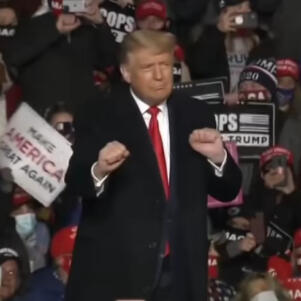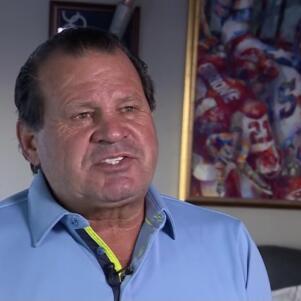Echoes of Colorado in Boston’s Olympic bid process
By Evan Lips | July 30, 2015, 16:06 EDT

In the early 1970s when then-Colorado state Rep. Richard Lamm (D) began to form an opposition movement to Denver’s bid to host the 1976 Winter Olympic Games, Lamm said he felt like he was “banging the last nails into my own political coffin.”
On Tuesday, the former Colorado politician recalled in a phone interview with the NewBostonPost how he spearheaded the state’s anti-Olympic movement after uncovering problems with the Denver bid.
Lamm said he secured more than 80,000 signatures statewide to force an initiative regarding funding for the Olympic games to appear on the 1972 ballot. Unlike a referendum, which is used by citizens to overturn laws passed by legislators, initiatives involve citizens proposing laws themselves.
Lamm’s initiative sought to prohibit the state from levying taxes and appropriating or loaning funds for the purpose of aiding or furthering the 1976 Winter Olympic Games.”
Colorado voters sided with Lamm. The initiative passed with 60 percent support.
Lamm said yesterday that, at the time, he worried his political career was over. But it wasn’t.
“What I thought would be the end of my political career was just the beginning,” he said.
In 1975, Lamm was elected governor. He served in that post until 1987, the longest gubernatorial stint in Colorado history.
Lamm said he’s watched closely as Boston grappled with its own Olympic ambitions before the grand vision came to a crashing halt early Monday afternoon. Lamm said he read local news reports of Boston’s bid process daily. He disagreed with the notion, expressed by some observers, that the opponents of Boston 2024 sought only to flex their parochial, NIMBY (not-in-my-backyard) muscles.
“When we fought it in Colorado, we were labeled as being unpatriotic,” Lamm said. “But the newspapers out here played a big role in telling people what was really going on.”
Lamm said the newspaper that dug deepest was the now-defunct Rocky Mountain News.
“The (Denver) Post was blindly pro-Olympics but the Rocky Mountain News was headed by Mike Howard of the Scripps-Howard chain,” Lamm said. “He was an honest newspaperman.”
I was for it, before I was against it.
Lamm explained that he openly supported Denver’s bid when it was first announced. He spoke about the excitement residents experienced when the U.S. Olympic Committee first came knocking at Denver’s door. Unlike Boston’s bid, Denver had secured approval from the International Olympic Committee in 1970, meaning the games were Colorado’s for the taking.
“It’s complicated,” Lamm said about the resolution he supported in 1969 to bring the games to Denver. “But in my first career I was a CPA. Because of that I was chair of the audit committee in the legislature. All I did most days was look at the books.
“It was very apparent to me and anybody I explained it to that (the USOC) dramatically overestimated revenue and underestimated expenses.”
When Lamm switched sides, the blowback from the pro-Olympics side was harsh. Denver Olympic Organizing Committee member Don Magarrell said it would be “the worst international disgrace in American history” if Colorado voters approved Lamm’s initiative.
Denver Mayor William McNichols said that if Lamm’s initiative passed “the people of Colorado would have to live with this shame for the rest of their lives.”
“Don’t Californicate Colorado.”
Lamm said Tuesday that, like Bostonians, Coloradans don’t like to be told what to do — especially by big-business interests and politicians. And they certainly don’t like to feel that they’ve been deceived. So when the promises and guarantees of the organizers were shown to be riddled with inconsistencies, the chorus of opposition swelled.
Promoters of the Denver games had produced an upbeat film linking the games with Colorado’s natural beauty. The film, which can be viewed on YouTube offers sweeping panoramas of snow-capped mountains and clips of sportsmen engaged in various outdoor activities. In the opening moments, the narrator describes Colorado as a “land of Olympian proportions.”
“Today Denver is the United States’ choice for hosting the 12th Winter Olympics,” the narrator states. “It is a most natural selection.
“Already nearly 80 percent of the facilities necessary for holding the 1976 games are constructed and ready.”
Not exactly, according to Lamm.
Colorado’s official bid book promised that all proposed competition sites would be located within an hour of Denver. But Lamm pointed out that several events were slated to be held in Steamboat Springs, a Western Slope town situated more than 150 miles away. A photo in the bid package depicting Mt. Sniktau, the location selected to host downhill skiing, was widely criticized when it became obvious that someone had airbrushed snow over images of bare ground.
Lamm said that the chosen site for cross country skiing in Evergreen, which sits 15 miles west of Denver, also had no snow.
“When people found out about these things through good reporting all of the sudden they were not so mesmerized by those Olympic rings,” Lamm said.
Around that time, the public began to question the true cost of hosting the Olympics, and Lamm said a unique bumper sticker began popping up on Colorado highways and byways.
“It was quite a slogan,” he said. “Don’t Californicate Colorado. At that time we were the fourth fastest growing state in the nation, and I think people wanted to pump the brakes a little bit.”
Lamm recalled how then-Gov. John Arthur Love crumbled under questioning about Evergreen’s ability to host both cross country skiing and bobsled events.
“When we challenged the fact there was no snow in Evergreen, the governor came right out and said, ‘I lied a little bit,’” Lamm said. “So in fact, he was just being honest.”
Lamm said that, like Bostonians, Coloradans understood that Denver would be the “insurer of last resort” for financial overruns.
“Mayor (Marty) Walsh made that same point the other day,” Lamm said. “No matter how wealthy a city might be, the costs to host the games are always going to be gargantuan.”
Lamm said he suspects Bostonians were also wary of the fact that “outsiders” were pushing the city to host the games. Asked if Coloradans held similar views during the early 1970s, Lamm said at that time many Colorado residents were also new to the state.
“People like me,” Lamm said, referring to the fact he was born and raised in Wisconsin. “I came to Colorado because of a love for the outdoors.
“But no matter how much we love our winter sports, there comes a point where you simply cannot justify telling the taxpayer to help cover the costs of 11 days of games.”
Contact Evan Lips at [email protected]










